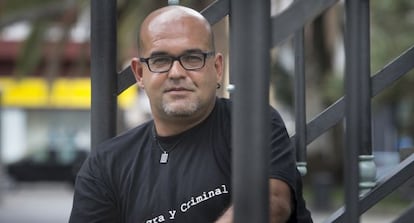Canarian crime writer confesses to fabricating rediscovered US pulp author
Alexis Ravelo admits book he purportedly unearthed by a 1950s novelist was all his own work

“Perhaps because of his own tendency to remain anonymous, Martin Aloysius West is one of the great forgotten figures of North American crime writing,” begins the author biography inside the 2012 novel El viento y la sangre (or, Wind and Blood).
In fact, M. A. West is so anonymous that he never existed.
The real writer of the book, Spaniard Alexis Ravelo – a noted author whose most recent novel won this year’s Spanish edition of the Hammett Prize for crime fiction – says he was trying to play a game with readers.
“This cult of the personality, which we inherited from Romanticism, sometimes makes the text itself lose value,” says Ravelo, 42, who hails from the Canary Islands. “Sometimes labels are a drag on your work. This [phony authorship] was a mask to prove to myself that I am not a Canarian writer, or a Spanish writer, or a bald writer, but simply a craftsman, a scribe.”
Literary experts expressed concern at never having heard of the author M. A. West
That was the origin of M. A. West, who will never write another book again, says Ravelo.
Until this week, El viento y la sangre was purported to be a pulp novel written by a US writer from Cincinnati that was published around 1950, after which his work fell into oblivion.
“I found it after some massive research work,” Ravelo first told Pere Sureda, of Spanish publishing house Navona Ediciones. “It could work for your crime novel collection.”
Sureda fell right into the trap, as he himself admits. He returned the call and Ravelo revealed that he had made up West’s biography, his literary references and the 10 other works that he allegedly wrote. He also said that the novel had not been written in the US but in Las Palmas de Gran Canaria, and that the translator mentioned in the book was in on the joke as well.
Sureda hesitated. But after a few moments of anger, he admitted that the trick was a good one. “Let’s play whatever you want to play, Ravelo,” he said.
Ravelo says he was trying to get people to focus on the story, rather than the writer
Ravelo says that he was trying to get people to focus on the story, rather than on an unknown writer from the middle of last century. He was trying to eliminate the labels.
The game is not a new one. French writer Boris Vian did something similar in the 1940s under the pseudonym Vernon Sullivan. “It’s a sin I wanted to commit,” says Ravelo. “The complicated part was creating something realistic while inside somebody else’s head, with the limitations imposed on this other person by his own geographical and historical context.”
El viento y la sangre is still selling well in bookstores, and publisher Navona has received good feedback about the work. “After becoming the author’s accomplice, I passed it along to major experts and friends of mine who applauded the work without realizing that the author is from the Canary Islands, and expressed concern at never having heard of M. A. West,” says Sureda.
The story takes place in Marksonville, a small town that serves as the backdrop for some explicit sex and a lot of violence that shows up a corrupt system in which the mafia plays a determining role. Ravelo describes M. A. West as a writer in dire economic straits with many children to support. He says that when he began writing the novel his own “fridge was very empty and my heart very full.”
In the two years that have elapsed since then, Ravelo has picked up two awards, one for his 2013 book La última tumba (or, The last grave) and another one for this year’s La estrategia del pequinés (The Pekinese’s strategy).
Tu suscripción se está usando en otro dispositivo
¿Quieres añadir otro usuario a tu suscripción?
Si continúas leyendo en este dispositivo, no se podrá leer en el otro.
FlechaTu suscripción se está usando en otro dispositivo y solo puedes acceder a EL PAÍS desde un dispositivo a la vez.
Si quieres compartir tu cuenta, cambia tu suscripción a la modalidad Premium, así podrás añadir otro usuario. Cada uno accederá con su propia cuenta de email, lo que os permitirá personalizar vuestra experiencia en EL PAÍS.
¿Tienes una suscripción de empresa? Accede aquí para contratar más cuentas.
En el caso de no saber quién está usando tu cuenta, te recomendamos cambiar tu contraseña aquí.
Si decides continuar compartiendo tu cuenta, este mensaje se mostrará en tu dispositivo y en el de la otra persona que está usando tu cuenta de forma indefinida, afectando a tu experiencia de lectura. Puedes consultar aquí los términos y condiciones de la suscripción digital.








































